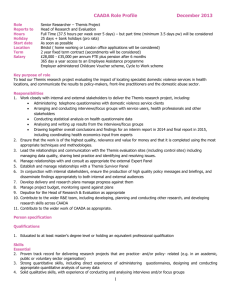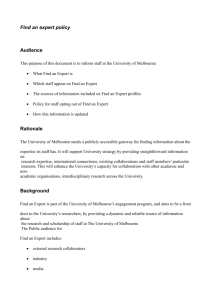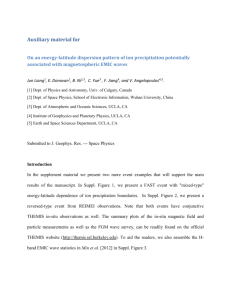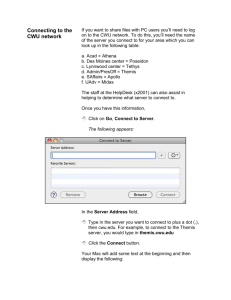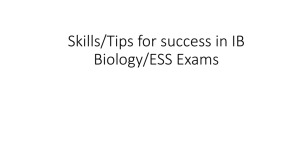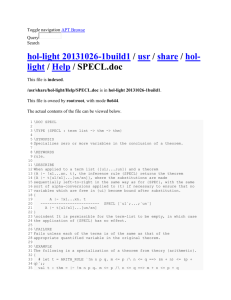Themis_Science_Software_Class
advertisement
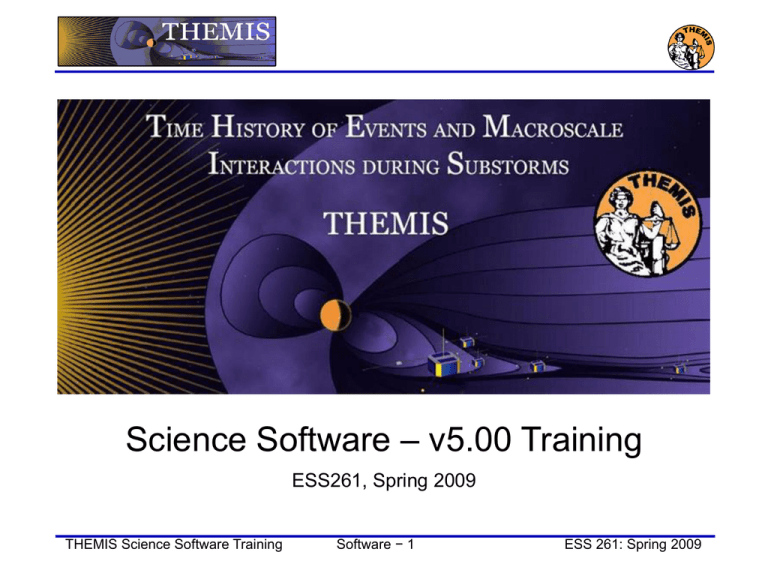
Science Software – v5.00 Training ESS261, Spring 2009 THEMIS Science Software Training Software − 1 ESS 261: Spring 2009 Agenda/Contributors 10:00 Introduction D. King 10:05 THEMIS Web Site D. King 10:15 V5.00 Science Software/Data Status J. McTiernan, J. Lewis 10:25 THEMIS Science Data Analysis Software J. McTiernan / B. Kerr 10:50 V5.00 New Themis Software Capabilities P. Cruce 10:00 V5.00 THEMIS Graphical User Interface (GUI) C. Goethel 10:30 THEMIS Ground Based Observatories (GBO) J. McTiernan 10:40 SPDF – CDAWeb Dieter Bilitza 10:50 Q&A’s All THEMIS Science Software Training Software − 2 ESS 261: Spring 2009 Status Report V5.00 Science Software/Data Status Report • • • • • • • • • • General – Loads, introduces and calibrates all L1 quantities, all instruments – Loads calibrated L2 quantities STATE – L1 STATE available since launch, L2 STATE in progress FGM – L1, L2 data available since early March 2007 FIT / FFT / FBK – L1, L2 data available since early March 2007 SCM – L1 data available since early March 2007 – L2 frequency spectrograms (FBK) available now EFI – All L1 data available from TH-C since May 2007, TH-D,E since Jun 7 ESA – No L1 data, only L0 data – however, read-in is transparent to user – All data available since ESA turn-on, i.e., mid-March – L2 omnidirectional energy spectrograms, ground moments available now SST – L1 data available since SST turn-on, mid-March – L2 omnidirectional energy spectrograms available now ASI – L1 thumbnail images from 21 stations available. L1 full-resolution images available up to late April 2008, – Mosaics, movies for full mission GMAG – L2 cdf files with ground magnetometer data from 41 stations THEMIS Science Software Training Software − 3 ESS 261: Spring 2009 THEMIS Data Analysis Software Organization Contributors UC Berkeley D Larson, H Frey, J Bonnell, J McFadden, A Keiling J McTiernan, J Lewis UCLA V Angelopoulos, P Cruce, B Kerr, C Goethel, M Feuerstein, K Ramer, H Schwarzl SP Systems K Bromund NASA/GSFC V Kondratovich MPE E Georgescu TUBS U Auster CETP P Robert, O LeContel Calgary B Jackel, E Donovan THEMIS Science Software Training Software − 4 ESS 261: Spring 2009 Overview Overview • Software Objectives – Powerful, Flexible Command Line Interface – GUI to provide Easy Access to Key Features • • • • Software Installation Data Distribution Key Routines, crib sheets. Examples THEMIS Science Software Training Software − 5 ESS 261: Spring 2009 Software Objectives • • • Code is available to everyone, not required to analyze data. IDL based (library of routines –but no main program!). Separates the tasks of: • • • • Platform independent. Works on: • • • • • Reading files. Manipulating data Plotting Solaris Linux Windows Mac OS X Self-Documenting • • Auto-generated html help: idl/_tdas_doc.html IDL> DOC_LIBRARY, ’routine_name’ THEMIS Science Software Training Software − 6 ESS 261: Spring 2009 Software Design THEMIS-specific routines (idl/themis) • • • • Instrument-specific routines organized according to ground/spacecraft/state, fields/particles, instrument name. – Loading data – Calibrating data Transforming data Examples – crib sheets GUI – built on top of the command-line routines General routines (idl/ssl_general) • • • • Library of generic routines useful for building mission-specific load routines – CDF reading/writing routines – File retrieval routines – Miscellaneous routines Plotting routines – Uses “tplot variables”: strings that associate data together with metadata and plotting parameters. – Routines to manipulate/plot tplot variables Data Export routines Data Processing routines External Libraries (idl/external) • • CDAWlib – from NASA SPDF, reads/plots CDF data IDL_GEOPACK – Magnetic field modelling kit THEMIS Science Software Training Software − 7 ESS 261: Spring 2009 System Requirements Windows, Solaris, LINUX, PPC Mac or Intel Mac. IDL 6.2 or higher required IDL Patch Recommended • • • http://cdf.gsfc.nasa.gov/html/cdf_patch_for_idl6x_new.html Required for IDL 6.2, (Strongly recommended for IDL 6.4 and 7.0) Required for Intel Mac, regardless of IDL version For Mac, system configurations are required to run IDL • • X11 – may need to be installed. mouse click-through – one-time X11 configuration necessary for proper operation: defaults write com.apple.x11 wm_click_through -bool true See THEMIS User's Guide for full information, available at: ftp://apollo.ssl.berkeley.edu/pub/THEMIS/ THEMIS Science Software Training Software − 8 ESS 261: Spring 2009 Installing/Configuring TDAS For a new installation: • Download and expand the latest TDAS release .zip file. The latest version is 4.01. http://themis.ssl.berkeley.edu/socware/tdas_4_01/tdas_4_01.zip • Create a directory called TDAS into which you will copy the latest software. Move the tdas_4_01 folder into the TDAS directory you created. • • Configure IDL to search the TDAS directory for IDL programs. Details on next slide. For an upgrade of an existing installation of TDAS, installed as per the above 4 steps: • • Remove old tdas_x_xx from the TDAS directory. Download and expand the latest TDAS release .zip file. • Copy the new tdas_x_xx directory into the pre-existing TDAS directory. • Re-start IDL. THEMIS Science Software Training Software − 9 ESS 261: Spring 2009 Path Setup Set up the IDL path • Windows and IDLDE on any platform: File->Preferences Path Tab Press Insert Browse to find the TDAS folder you created. Check the box preceding the path to 'search subdirectories' • UNIX-like systems (Mac OS X, Linux, Solaris) In .cshrc: setenv IDL_PATH ‘<IDL_DEFAULT>:+/path/to/tdas’ -OrIn .bashrc or .bash_profile: export IDL_PATH=‘<IDL_DEFAULT>:+/path/to/tdas’ Path to Data Directory • Data directory will be created automatically at – – • C:/data/themis (Windows) ~/data/themis (UNIX/LINUX/Max OS X) Run thm_ui_config from command line or THEMIS GUI if you need to change this. THEMIS Science Software Training Software − 10 ESS 261: Spring 2009 Data Definitions The software operates on Level 1 and Level 2 data. Data Level Definitions: Level 0 Data – • Raw files (*.pkt) one per APID. • Only used for loading ESA data. Level 1 Data • CDF (Common Data Files) files (*.cdf) • Files contain raw, uncalibrated data. i.e. counts, DAC units. • Requires TDAS software to interpret. Calibration is done by default when Level 1 data is input. Level 2 Data • CDF files – contain physical quantities – TDAS software is not needed for interpretation. • Files available for ESA, FBK, FIT, FGM, MOM*, SST – can be downloaded from SPDF. *(except for MOM) THEMIS Science Software Training Software − 11 ESS 261: Spring 2009 Data / Directory structure • • • Data Directory structure is large! • • Scores of files per day ~3GB/day for all probes (L1 data) Directory hierarchy keeps directory sizes manageable • • Software performs automatic file retrieval. Software maintains directory hierarchy. Behaviour of Automatic File Retrieval is configurable • ‘No Download’ mode for stand-alone operation. • ‘No Update’ mode to preserve local modifications. • Root directory of local copy of hierarchy is determined automatically, but configurable. Available configuration methods: • – – – thm_ui_config IDL widget Button on THEMS GUI widget Environment variables THEMIS Science Software Training Software − 12 ESS 261: Spring 2009 Primary Routines Load Routine Summary Name thm_load_asi thm_load_ask thm_load_efi thm_load_esa thm_load_esa_pkt thm_load_fbk thm_load_fft thm_load_fgm thm_load_fit thm_load_gmag thm_load_hsk thm_load_mom thm_load_scm thm_load_sst thm_load_state Description All-Sky Imager. All Sky Keogram Electric Fields Instrument waveforms ElectroStatic Analyzer ElectroStatic Analyzer Fields Filter Bank On-board Fields Fast Fourier Transform. Flux Gate Magnetometer waveforms On-Board Fields Spin-Fit Ground Magnetometer Housekeeping On-board Particle Moments Search Coil Magnetometer waveform Solid State Telescope Orbit and Attitude L0 L1 raw * * * L2 calibrated (*) * * * * * * * * * * * * * * v2 (*) (*) - * * * * Notes: (*) calibration routine available but still under development - data reduction and analysis routines available: see crib sheet THEMIS Science Software Training Software − 13 ESS 261: Spring 2009 Primary Routines Usage Conventions: Use keywords to determine functionality level - Calibrated Level 1 data is the default (Except for SST and ESA data, which is handled differently). datatype and probe keywords determine which data is loaded and/or created through calibration process /get_support_data keyword is needed in thm_load_state to load data required by thm_cal* and thm_cotrans routines. To load uncalibrated data, set type = ‘raw’ (For all but SST, ESA) Example from IDL Command Line: timespan,’2007-07-07’,1 ;choose a time range thm_load_state, probe = 'a', /get_support_data thm_load_fgm, probe='a', coord='gsm', datatype='fgl', level=1 THEMIS Science Software Training Software − 14 ESS 261: Spring 2009 Variable Names Probe specification. Example: tha • a – can be one of [a-e] specifies probe Particle data. Example: tha_peif • p – particles • e – ESA, s – SST • i – ions, e – electrons • f – full, r – reduced, m – moments, b – burst FGM data. Example: tha_fgl • l – low telemetry rate, h – high telemetry rate, e – engineering decimated high rate, s – spin fit. Electric Fields and SCM. Example: tha_efs • ef - efi, sc – scm, fb – fbk, ff – fft • s – spin fit, f – full orbit or fast survey, p – particle burst, w – waves burst. Wildcards are accepted in names when plotting and data processing: • th?_fg? • th[ab]_fg[lh] • th?_state* THEMIS Science Software Training Software − 15 ESS 261: Spring 2009 Crib Sheets Crib Sheets for Loading, Processing and Plotting thm_crib_asi thm_crib_dproc thm_crib_efi thm_crib_esa_da thm_crib_esa_moments thm_crib_export thm_crib_fac thm_crib_fbk thm_crib_fft thm_crib_fgm thm_crib_fit thm_crib_gmag thm_crib_mom thm_crib_mva thm_crib_overplot thm_crib_part_getspec thm_crib_scm thm_crib_sst thm_crib_state thm_crib_tplot thm_crib_tplotxy thm_crib_twavpol thm_map_examples IDL>.run thm_crib_asi or cut and paste, or copy and modify THEMIS Science Software Training Software − 16 ESS 261: Spring 2009 Coordinate Transformations Coordinate Transformations • thm_cotrans – transforms to/from any of the following coordinate systems in a single call – updates metadata in output. – knows coordinate system of input from metadata • Currently Supported Geophysical Coordinate Systems – – – – – – – – • SPG SSL DSL GEI GSE GSM SM GEO Spinning Probe Geometric Spinning SunSensor L-vectorZ Despun SunSensor L-vectorZ Geocentric Equatorial Inertial Geocentric Solar Ecliptic Geocentric Solar Magnetospheric Solar Magnetic Geographic Coordinate System Example (using previously loaded FGM and STATE data) – thm_cotrans, 'th?_fg?', out_coord='geo‘, ouf_suffix = ‘geo’ THEMIS Science Software Training Software − 17 ESS 261: Spring 2009 Plotting & Analysis Routines Plotting • • • • • • • • tplot tplotxy plotxy plotxyz tplot_names tlimit get_data store_data Example: tt89,'thc_state_pos',newname='model_field' Analytic Coordinate Transformations – tvector_rotate – fac_matrix_make – thm_fac_matrix_make – minvar_matrix_make Tsyganenko Model – (t)trace2iono – (t)trace2equator – (t)t89 – (t)t96 – (t)t01 – (t)t04s fac_matrix_make,'model_field' ,other_dim= 'xgse', newname = 'fac_mat' tvector_rotate, 'fac_mat', 'thc_peir_velocity', newname = 'ion_velocity_model_fa' THEMIS Science Software Training Software − 18 ESS 261: Spring 2009 Command Line Example 1 – To load data: » » – timespan,'6-10-2',2,/days thm_load_gmag,site='ccnv',$ /subtract_average To plot data: » » » options,'thg_mag_ccnv',$ labels=['Bx','By','Bz'] tplot_options, 'title', $ 'GMAG Examples' tplot,’thg_mag_ccnv’ THEMIS Science Software Training Software − 19 ESS 261: Spring 2009 Command Line Example 2 – Wavelet transform on an interval of interest – Define and display the interval » » Tr = ['2006-10-2/16:00','2006-10-3/05'] timebar,tr – – – – THEMIS Science Software Training Software − 20 Split the 3-vector into components: » split_vec,'thg_mag_ccnv' Compute transform of one component » wav_data,'thg_mag_ccnv_x',/kol $ ,trange=tr ,maxpoints=24l*3600*2 Set color limits (log scale) » zlim,'*pow', .0001,.01,1 Plot it. » tplot,'*ccnv_x*',trange=tr ESS 261: Spring 2009 Plotting Examples tplotxy can be used to plot isotropic position plots. Like plots of magnetic field models and spacecraft position Plotxyz can be used to plot 3 dimensional isotropic data, with any axis.(Not restricted to timeseries.) THEMIS Science Software Training Software − 21 ESS 261: Spring 2009 Plotting Angular Spectra full Pitch angle spectra for full and reduced mode electron ESA data. Plotted using tplot. reduced thm_part_getspec, $ probe=['c'], $ ;select probe trange=['07-06-03/01:08', $ ;select timerange '07-06-03/04:20'], $ data_type=['peef','peer'], $ ;select data type angle='pa', $ ;select pitch angle spectra regrid=[32,16] ;set resolution of pitch/gyro spectra full reduced THEMIS Science Software Training Software − 22 ESS 261: Spring 2009 Trace / Orbit Plots Trace / Orbit Plots • New routines have been added to perform different 2d projections of 3d data. This particularly useful for plotting orbits and field lines. • A Tsyganenko interface has been added to TDAS that allows us to calculate model field lines for T89,T96,T01,&T04 models. Field lines can also be Traced. • Examples of these routines can be found in themis/examples/thm_crib_trace.pro, themis/examples/thm_crib_plotxy.pro and themis/examples/thm_crib_tplotxy • The graphics in this slide were generated with thm_crib_trace.pro Example: .run thm_crib_trace.pro • A routine was added to plot an arbitrarily sized and spaced AACGM coordinate grid on a world map. reduced THEMIS Science Software Training Software − 23 ESS 261: Spring 2009 Trace / Orbit Plots Trace/Orbit Plots - AACGM/Iono Trace Plot reduced THEMIS Science Software Training Software − 24 ESS 261: Spring 2009 Trace / Orbit Plots Trace / Orbit Plots – XY Plot reduced THEMIS Science Software Training Software − 25 ESS 261: Spring 2009 Trace / Orbit Plots Trace / Orbit Plots – XZ Plot reduced THEMIS Science Software Training Software − 26 ESS 261: Spring 2009 Mini Language THEMIS – Mini Language • Simple scripting language has been written in IDL. • This language allows access to some data analysis functionality in the IDL virtual machine and eases manipulations of time series data.(tplot) • This language allows composition of statements and functions with order of operations to give significant flexibility in statement construction. • Examples: 1: Position to RE: calc,'"tha_pos_re" = "tha_state_pos"/6374.4’ 2: Natural log of total esa density: calc,'"tha_density_log" = ln("tha_peir_density"+"tha_peer_density“) 3: Store tplot data in non-tplot idl variable: calc,'var_data = "tha_efs“’ 4: Average Magnetic Pressure: calc,'Pb_avg = mean(0.01*total("tha_fgs_dsl"^2,2)/25.132741)‘ Additional examples can be found in themis/examples/thm_crib_calc.pro reduced THEMIS Science Software Training Software − 27 ESS 261: Spring 2009 THEMIS Add’l New Features THEMIS – Additional New Features • Solar Wind Code - The solar wind code serves SW data propagated to the bow-shock nose, which can be used, potentially, by various applications (currently, they are used in dynamic magnetopause model). The code takes WIND SWE and MFI data, served by SPDF, and propagates them to the bow-shock nose using OMNI methodology. There is also the option of use of already-propagated OMNI HRO and OMNI-2 data. Recently-appeared opportunity to test directly the propagated data by comparison with THEMIS B data shows a good agreement and potential for improvement. • Outlier Removal Code - Quadratic trend is determined in a hollow vicinity of each point. The data value is compared with the trend value. If the deviation is statistically improbable, the value is repaired. There are 6 options for repair to chose. • We have now six new routines which allow downloading/creating all A-indices from Kyoto, the Dst index from Kyoto, and the pseudo A-indices using THEMIS data plus crib sheets for each routine. All routines are fully "automatic", i.e., they don't require any manual download of data. • Program developed to read ACE ascii data. Example: idl> noaa_ace_nrt_load • A new plotting routine (plotxyvec.pro) has been added for plotting arrows on top of plotxy and plotxyz plots. In addition a new routine grad.pro has been developed for calculating the gradient of a scalar field. Examples of usage can be found in themis/examples/thm_crib_plotxyvec.pro THEMIS Science Software Training Software − 28 ESS 261: Spring 2009 Trace / Orbit Plots Plotxyvec – Position/Velocity Plot reduced THEMIS Science Software Training Software − 29 ESS 261: Spring 2009 THEMIS New GUI Features THEMIS – New GUI Features • UCLA SPLASH GUI used as a model for the design • Windows Environment - provides a universal and standard interface Pull Down Menu’s Tool Bar Accelerator Keys • Increased User Interaction – added cursor, mouse, and keyboard features Click and Drag, Single/Double Clicks, Tab/Backspace, and Right/Left Arrow keys • Plot Capabilities – multiple pop up windows allow user to control plot settings Line/Spectral plots X/Y Axis and Grid styles Panel layout Page setup • Tracking –vertical and horizontal tracking features cross hairs displayed as cursor moves over plot region, data is displayed and updated as cursor moves • Markers – users can select regions of interest by Ctrl-Click-Drag • Variables - user can select any loaded data to be displayed at bottom • Analysis – additional capabilities include the new mini language, a nudge function, and analysis routines • Original GUI – all current functionality will be preserved, including data analysis THEMIS Science Software Training Software − 30 ESS 261: Spring 2009 THEMIS GUI Dates New THEMIS GUI Availability Dates • Release with TDAS v5.0 during January 2009 • Webcast Trainings during January 2009 • January 2009 Release for PC – Windows Phase II Release for Mac and Linux • Original GUI will still be available until April 2009 THEMIS Science Software Training Software − 31 ESS 261: Spring 2009 THEMIS software for GBO all-sky imager Thm_crib_asi.pro Harald U. Frey THEMIS Science Software Training Software − 32 ESS 261: Spring 2009 THEMIS GBO network THEMIS Science Software Training Software − 33 ESS 261: Spring 2009 All-sky imager data products 1. Keograms along local magnetic meridian • Delivered daily jpeg-compressed • Reprocessed ½ year later with full resolution images 2. Geomagnetically mapped thumbnail images • Delivered daily square-root intensity compression • 1024 pixels within +-8o magnetic Latitude and ~+-12o Longitude • 3 seconds temporal resolution 3. Full resolution images • 256x256 pixels covering about 600 km radius around station • Delivered about ½ year later • 3 seconds temporal resolution • Full 16 bit intensity scale THEMIS Science Software Training Software − 34 ESS 261: Spring 2009 Daily overview of available keograms THEMIS Science Software Training Software − 35 ESS 261: Spring 2009 Zoom into interesting time THEMIS Science Software Training Software − 36 ESS 261: Spring 2009 Watch “movie” of single station THEMIS Science Software Training Software − 37 ESS 261: Spring 2009 Mosaic of whole GBO array from full resolution images THEMIS Science Software Training Software − 38 ESS 261: Spring 2009 Mosaic with S/C footprint From thumbnail images Black line marks footprint of THEMIS-P2 during whole night Asterisk marks location at time of mosaic THEMIS Science Software Training Software − 39 ESS 261: Spring 2009 Ground magnetometer Examples Thm_crib_gmag.pro THEMIS Science Software Training Software − 40 ESS 261: Spring 2009 Three station example THEMIS Science Software Training Software − 41 ESS 261: Spring 2009 Wavelet transform example THEMIS Science Software Training Software − 42 ESS 261: Spring 2009 Pseudo-AE of network THEMIS Science Software Training Software − 43 ESS 261: Spring 2009 Data and Orbits at SPDF THEMIS Science Software Training Software − 44 http://spdf.gsfc.nasa.gov ESS 261: Spring 2009 CDAWeb - THEMIS data Level-2 Data from all 4 Instruments on all 5 Satellites Ground Magnetometer Data from 42 stations (GBO, GEONS) NEW: Keograms from 22 All-Sky-Imagers (ASI) going back to 2005. All data updated daily (auto-ingest) from THEMIS data site. GIF-Walk: pre-generated Magneto-pause Crossing Survey plots (David Sibeck, NASA GSFC) THEMIS Science Software Training Software − 45 http://cdaweb.gsfc.nasa.gov ESS 261: Spring 2009 CDAWeb - News November 25, 2008: All THEMIS L2 FIT files reprocessed to fix data problem - new files available in CDAWeb on November 24, 2008. November 10, 2008: CDAWeb has been updated to contain all of the newly reprocessed THEMIS ESA, FGM, SST and State files. This new version of the THEMIS L2 ESA files contain data quality variables (which are applied to the marked variables when plotted). New functionality added to all output pages: Previous/Next buttons produce the next or previous plot, listing or cdf. Postscript and PDF plotting files now supported for all plot types except images. THEMIS Science Software Training Software − 46 http://cdaweb.gsfc.nasa.gov ESS 261: Spring 2009 CDAWeb - Other Data Many data products of THEMIS interest: ACE, Cluster, Geotail, FAST, NOAA, GOES, LANL, Wind … ITM data to study storm effects in ITM region: TIMED, ROCSAT, GPS (under development) THEMIS Science Software Training Software − 47 http://cdaweb.gsfc.nasa.gov ESS 261: Spring 2009 SSCweb TIPSOD Orbits for most science satellites, updated regularly and often including predicts. TIPSOD 4-D orbit viewer Saved queries for typical THEMISrelated SSCweb runs (1-click access). THEMIS Science Software Training Software − 48 http://sscweb.gsfc.nasa.gov ESS 261: Spring 2009 SSCweb TIPSOD THEMIS Science Software Training Software − 49 ESS 261: Spring 2009 http://sscweb.gsfc.nasa.gov THEMIS Science Software Training Software − 50 ESS 261: Spring 2009 Common Data Format- CDF CDF Version 3.2.2 release, fixes memory leak and ReadOnly mode problems, and includes some changes for the tool programs. CDF Patch for Matlab CDF Patch for IDL 6+ (strongly recommended) CDF's Java Network Launching Protocol latest development THEMIS Science Software Training Software − 51 http://cdf.gsfc.nasa.gov ESS 261: Spring 2009
